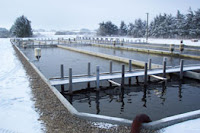 The Aquaculture industry blossomed rapidly, and became a significant supplier of food over the last couple of decades. Aqua Farming is now practiced worldwide, each year it increases in scope and significance. The aquaculture industry grew out of necessity, the chief reason being that the traditional practice of hunting and gathering of food by fishing became unsustainable in many areas of the world.
Read More Here
The Aquaculture industry blossomed rapidly, and became a significant supplier of food over the last couple of decades. Aqua Farming is now practiced worldwide, each year it increases in scope and significance. The aquaculture industry grew out of necessity, the chief reason being that the traditional practice of hunting and gathering of food by fishing became unsustainable in many areas of the world.
Read More Here
Growth Trough Innovation
The need for change in seafood supply lead us to Aquaculture and now the need for changes in the way we farm fish has lead us to developing alternative methods to conduct aquaculture in a more sustainable manner. One of new technologies that are having a tremendous impact upon the way we farm fish is land based farming in enclosed tanks using water recycling systems. Read More Here
 An innovative combination of fish and vegetable farming methods that is experiencing renewed interest and rapid growth around the world is Aquaponics. This farming method is essentially the rebirth of age old practices and is now used to farm vegetables, herbs and fish synergistically. It is an eco-friendly way to naturally produce quality food for home use or for sale. This scalable farming method is being embraced by many small home growers and even large operations that are using the process and methods as a means of producing sustainable fish and plant crops. Read More Here
An innovative combination of fish and vegetable farming methods that is experiencing renewed interest and rapid growth around the world is Aquaponics. This farming method is essentially the rebirth of age old practices and is now used to farm vegetables, herbs and fish synergistically. It is an eco-friendly way to naturally produce quality food for home use or for sale. This scalable farming method is being embraced by many small home growers and even large operations that are using the process and methods as a means of producing sustainable fish and plant crops. Read More Here
Aquaculture Industry Size
Aquaculture, probably the fastest growing food-producing sector, now accounts for nearly 50 percent of the world's food fish. The reason for this is very simple, aqua farming is the best and most sustainable method to meet the demand for fresh seafood products that our population creates. It is now a widely held view that the worldwide biomass of wild fish and shellfish (stocks) are continuing to be depleted at a rate that surprises even those scientists that made dire predictions a few short years ago. Read More Here.

No comments:
Post a Comment